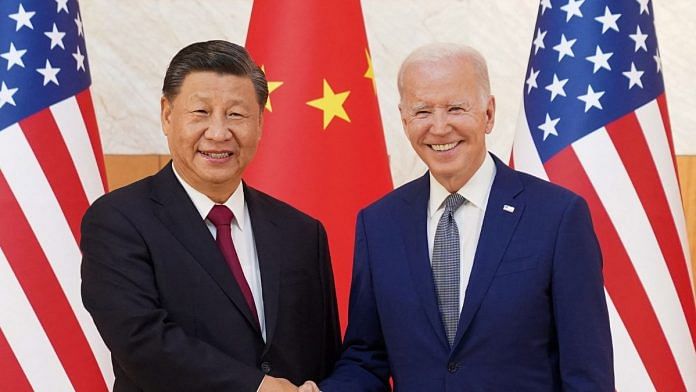A highly anticipated meeting between US President Biden and China’s President Xi Jinping concluded on 14 November with both leaders expressing an openness to repairing the relationship. On the sidelines of the Group of 20 summit in Bali, Indonesia the two leaders discussed the war in Ukraine, tension in the Taiwan Strait and North Korea’s missile tests. Not only for their complicated rivalry, but the meeting is being observed keenly because an earlier diplomatic encounter between the two nations had turned into a sparring contest in front of reporters.
At the Anchorage meeting last year, ill-tempered talks involved Secretary of State Antony Blinken and National Security Adviser Jake Sullivan with China’s most senior foreign policy official, Yang Jiechi, and foreign minister Wang Yi. Yang Jiechi had opposed the “tone of the US side”, marking a difficult beginning to the US-China relations under the Biden administration.
According to new reports, the American translator had committed at least seven mistakes that could have made the US officials sound bolder and less nuanced than they actually were. This is risky occurrence in a multilingual world where the balance of history hinges on different interpretations of words. While some argued that the dramatic exchange paved the way for frank dialogue, the mistranslations could have led either side to doubt the intentions of the other.
Also read: India can’t afford to keep pvt healthcare out of Ayushman Bharat Digital. Govt must do more
Overcoming unintentional provocations
Writing about the character of a translator’s job, Anna Aslanyan, literary translator and public service interpreter, mentions that the gaps formed by conceptual differences and cultural assumptions can often force translators to rely solely on their own judgment. Decades of scientific research have revealed the limits to human senses and to the capacity of processing information that affect decision-making and problem-solving by producing cognitive biases that undercut expertise thereby negatively impacting diplomatic negotiations.
The research have also demonstrated that artificial intelligence (AI) is emerging as a widely available technology that, if used appropriately, could provide significant advantages for the practice of diplomacy. AI can enhance decision and policy-making by synthesising and summarising vast amounts of data, more data than human beings possibly can. As a result, it can gather and filter information, simulate forecast possible outcomes and make recommendations that can significantly improve the optimality of diplomacy. If deployed strategically, these technologies could decrease response time and reduce human error. For instance, diplomats can supplement human translation in international dialogues with AI-assisted wearable technology, which can summarise immense volumes of foreign text. It also has the potential to notify the diplomat every time they catch a shift in human sentiment during conversations, a useful feature since Aslanyan noted that the translator’s real concern is not words but sense.
At the core of diplomacy are negotiations that address concurrent impasses. In Bali for instance, the optimism was tempered as Biden and Xi did not resolve the key drivers of disagreement on trade sanctions, China’s interests in Taiwan or Beijing’s human rights record but agreed to collaborate on transnational challenges like food security and climate change. With the aim to develop AI that could optimise resolutions to several problems simultaneously, Google DeepMind is simulating board game Diplomacy, which demands mixed motives and multiple-agent interactions. Not only big tech, the United Nations alone is developing over 200 AI applications.
In 2020, UN Global Pulse partnered with the WHO Regional Office for Africa (WHO/AFRO) and embarked on a project about Covid-19-related falsehoods. The researchers believe the large volumes of information flowing through society can affect decision-making processes due to a lack of time to run quality control.
Also read: Green superpower: India must leverage its startup ecosystem for its net-zero transition
Infusing personal with the technological
In all these cases, AI can aid policymakers in surfacing meaning from a deluge of data, allowing them to coordinate shared objectives and prevent crises. They each represent a collaborative effort in service of humans. The question of whether AI will replace humans assumes that AI and humans have the same qualities and abilities. AI-based machines are fast, more accurate, and consistently rational, but they lack intuition, charm and persuasion.
Research has found that significant undesirable bias along racial, gender or religious lines is introduced into AI algorithms when unfiltered data are used. In the scheme of world politics, these technologies present significant ethical and practical challenges that require international agreements. Such agreements will need to consider technological asymmetries between nations, privacy concerns, and the potential for espionage. While this technology can successfully overcome the natural limits of humans, it will require considerable time to be adopted by a community that is built solely on the tradition of interpersonal relationships.
“I know him well, he knows me,” Biden, a politician who is proud of his ability to develop diplomatic relationships by infusing the political with the personal, told the media before leaving for Bali. The three-hour long discussion was constructive indicating more space for diplomatic negotiations between the US and China. Maybe Secretary of State Antony Blinken can insist his translators rely on AI to avoid unintentional provocations when he visits China sometime early next year.
Shibani Mehta is a senior research analyst with the Security Studies Program at Carnegie India.
(Edited by Tarannum Khan)



